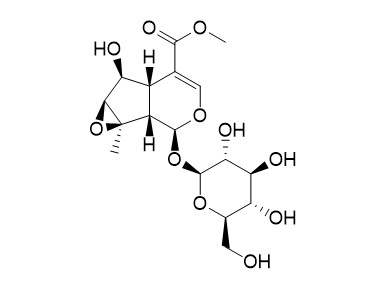Phlorigidoside C
Phlorigidoside C possessed significant anti-rheumatoid arthritis (RA) activities on adjuvant-induced arthritis, which might be ascribed to the regulation of inflammatory cytokines IL-1β, TNF-α, IL-6, IFN-γ IL-17 and IL-10, as well as inhibition of OPG/RANKL/NF-κB signaling pathways.
Phlorigidoside C, a natural iridoid glucoside, possesses anti-rheumatoid arthritis effect.
Inquire / Order:
manager@chemfaces.com
Technical Inquiries:
service@chemfaces.com
Tel:
+86-27-84237783
Fax:
+86-27-84254680
Address:
1 Building, No. 83, CheCheng Rd., Wuhan Economic and Technological Development Zone, Wuhan, Hubei 430056, PRC
Providing storage is as stated on the product vial and the vial is kept tightly sealed, the product can be stored for up to
24 months(2-8C).
Wherever possible, you should prepare and use solutions on the same day. However, if you need to make up stock solutions in advance, we recommend that you store the solution as aliquots in tightly sealed vials at -20C. Generally, these will be useable for up to two weeks. Before use, and prior to opening the vial we recommend that you allow your product to equilibrate to room temperature for at least 1 hour.
Need more advice on solubility, usage and handling? Please email to: service@chemfaces.com
The packaging of the product may have turned upside down during transportation, resulting in the natural compounds adhering to the neck or cap of the vial. take the vial out of its packaging and gently shake to let the compounds fall to the bottom of the vial. for liquid products, centrifuge at 200-500 RPM to gather the liquid at the bottom of the vial. try to avoid loss or contamination during handling.
Acta Physiologiae Plantarum2015, 37:1736
BMB Rep.2018, 51(5):249-254
Journal of Pharmaceutical Investigation2024, 024-00662-1.
Vietnam J. Chem.2023, 61(3),308-317
Processes 2021, 9(5),894.
Mediators Inflamm.2016, 2016:7216912
Enzyme and Microbial Technology2022, 110002.
Cell.2022, 185(23):4298-4316.e21.
Molecules.2023, 28(10):4062.
Korean Journal of Pharmacognosy2019, 50(4):285-290
Related and Featured Products
J Ethnopharmacol . 2021 Feb 10;266:113402.
Anti-rheumatoid arthritis effects of iridoid glucosides from Lamiophlomis rotata (Benth.) kudo on adjuvant-induced arthritis in rats by OPG/RANKL/NF-κB signaling pathways[Pubmed:
32980481]
Ethnopharmacological relevance: Lamiophlomisrotata (Benth.) Kudo. has been used to treat trauma bleeding, rheumatism, yellow water disease in traditional Chinese medicine.
Aim: The aim of this work was to evaluate the anti-rheumatoid arthritis (RA) activities and underlying mechanisms of the total iridoid glucosides (TIG) from Lamiophlomisrotata (Benth.) Kudo.
Methods: The chemical constituents of TIG was analyzed by high-performance liquid chromatography (HPLC) with seven reference compounds (penstemonoside, chlorotuberside, shanzhiside methyl ester, phloyoside, 7-epliamalbide, Phlorigidoside C and lamalbide). The anti-rheumatoid arthritis effects of TIG were investigated by arthritis indexes and paw swelling degrees, as well as histopathological and Micro-CT analysis in adjuvant-induced arthritis (AIA) rats. The impacts of TIG on the level of inflammatory cytokines (IL-1β, TNF-α, IL-6, IFN-γ, IL-17 and IL-10), and the regulation of OPG/RANKL/NF-κB pathways were determined by the ELISA and western blot, respectively.
Results: TIG significantly reduced the arthritis indexes and paws swelling in AIA rats, attenuated the inflammation and bone destruction in joint tissues, reduced the generation of pro-inflammatory cytokines IL-1β, TNF-α, IL-6, IFN-γ and IL-17, as well as increased the generation of anti-inflammatory cytokine IL-10 in serum. Moreover, TIG markedly inhibited the expression of p-IKK-α, p-IκB and p-p65, and decreased the ratio of OPG/RANKL in the synovial tissues.
Conclusion: TIG possessed significant anti-RA activities on adjuvant-induced arthritis, which might be ascribed to the regulation of inflammatory cytokines IL-1β, TNF-α, IL-6, IFN-γ IL-17 and IL-10, as well as inhibition of OPG/RANKL/NF-κB signaling pathways.
Phytochemistry . 2000 Apr;53(8):931-935.
Phlorigidosides A-C, iridoid glucosides from Phlomis rigida[Pubmed:
10820806]
From the aerial parts of Phlomis rigida, three iridoid glucosides, phlorigidoside A (2-O-acetyllamiridoside), B (8-O-acetyl-6-beta-hydroxyipolamide) and C (5-deoxysesamoside), were isolated together with the known iridoid glucosides, shanzhiside methyl ester, 8-O-acetylshanzhiside methyl ester, deoxypulcheloside I, lamiridoside, and 6-beta-hydroxyipolamide. The structures of the new compounds were elucidated based on spectral and chemical evidence.
Zhong Yao Cai . 2014 Mar;37(3):439-442.
[Isolation and identification of nine iridoid glycosides from Lamiophlomis rotata by HPLC combining PDA and MS][Pubmed:
25174110]
Objective: To establish a rapid chromatographic method to separate the iridoid glycosides from Lamioplomis rotata, and to identify the target compounds with PDA and MS.
Methods: Methanol-water gradient elution was used to separate and analyze the target compounds. The fluid fractions were gathered according to the chromatogram and dried with the nitrogen airflow. The mass fractions of the target compounds were determined with RP-HPLC and the structures were identified with PDA and MS.
Results: The purity of some compounds exceeded 90% and these 9 compounds were identified as iridoid glycosides, which were Phlorigidoside C (1), Schismoside (2), Sesamoside (3), Shanzhiside methylester (4), 6-O-Acetyl shanzhiside methylester (5), Phloyoside II (6), Penstemoside (7), Loganin (8) and 8-O-Acetyl shanzhiside methylester (9).



